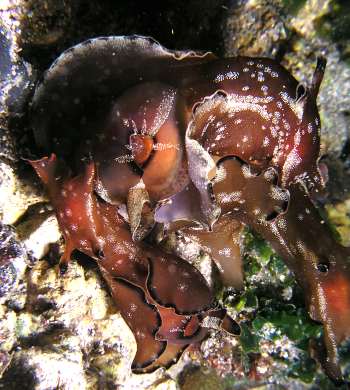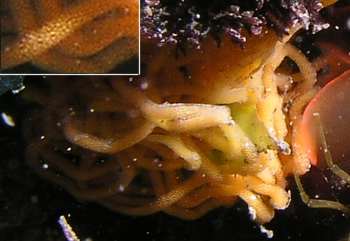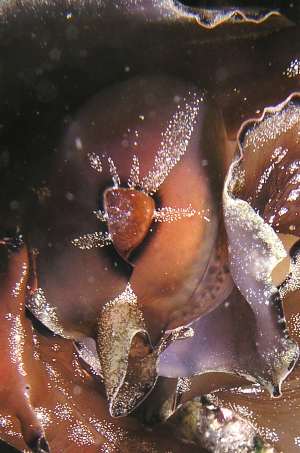Aplysia parvula laying eggs
May 26, 2005
From: Dong Bum Koh


Dear Bill,
Here are some photos of what I think is Aplysia parvula with its mating and eggs for the Sea Slug Forum.
Locality: Hwa Soon, Jeju Id, Sth Korea. Depth: 4 m. Length: 20 mm. 18 May 2004. Rocky bottom. Photographer: Sang Yual Shin
Best regards,
Dong Bum Koh
drkoh@seasee.co.kr
D. B. Koh, 2005 (May 26) Aplysia parvula laying eggs. [Message in] Sea Slug Forum. Australian Museum, Sydney. Available from http://www.seaslugforum.net/find/13800
Dear Koh,
Thanks for these photos which I agree are of Aplysia parvula. I have included a close-up here of part of the upper photo, as it shows the inside of the parapodial cavity of a Sea Hare very well. The black ring, with whitish rays radiating out from it, is the edge of a hole [foramen] in the mantle, which exposes part of the shell, which lies embedded in the mantle tissue. We can see part of the brown shell quite clearly. Aplysia parvula is one of a few species with a large hole like this. In most species there is only a tiny pore, sometimes on a small papilla. Directly below the foramen, in the photo, we can see a tube or funnel, which is the exhalent siphon which directs water out of the mantle cavity. The mantle cavity is directly below the shell, so we can't actually see it. In it sits the gill and the reproductive openings.
Best wishes,
Bill Rudman
Related messages
-
Aplysia parvula from sthn Queensland
From: Gary Cobb, August 20, 2009 -
Nudibranch? from Bay of Islands, New Zealand
From: Junya Kato, April 3, 2008 -
Aplysia parvula from the Madeira Islands
From: Magno Freitas, February 4, 2008 -
Aplysia parvula in Reunion Island
From: Philibert Bidgrain, February 1, 2007 -
Sea Hare from Indonesia
From: Linda Ianniello, November 23, 2006 -
Hawaiian Aplysia?
From: Sean Kearney, July 20, 2006 -
Aplysia parvula from sthn Queensland
From: Bruce Wilkie, February 10, 2006 -
Please identify this Sea Hare
From: Eileen Baker, February 2, 2006 -
Re: Aplysia parvula - color forms?
From: Asther M. Lau, January 24, 2006 -
Re: More on Aplysia parvula color forms
From: Asther M. Lau, January 24, 2006 -
Aplysia parvula from eastern Russia
From: Alexei Chernyshev , January 12, 2006 -
Aplysia parvula from Halmahera, Indonesia
From: Richard Harlan, June 9, 2005 -
Re: Aplysia parvula - eaten by Nemertine worm
From: Jon Norenburg, May 3, 2005 -
Aplysia parvula - eaten by Nemertine worm [1]
From: Dong Bum Koh, April 29, 2005 -
Aplysia parvula - eaten by Nemertine worm [2]
From: Dong Bum Koh, April 29, 2005 -
Aplysia parvula from Fethiye Bay, Turkey
From: Ant Turkmen, July 15, 2004 -
Aplysia parvula from South Australia
From: Carol van der Pennen, January 15, 2004 -
Colour variation in Aplysia parvula
From: Marina Poddubetskaia, December 16, 2003 -
Food of Aplysia parvula in Mayotte
From: Marina Poddubetskaia, December 16, 2003 -
Re: Other Aplysia parvula from Senegal
From: Marina Poddubetskaia, July 17, 2003 -
Re: Aplysia parvula from Outer Hebrides
From: Jun Imamoto, July 11, 2003 -
Other Aplysia parvula from Senegal
From: Marina Poddubetskaia, July 8, 2003 -
Aplysia parvula from Senegal
From: Marina & Patrice, April 29, 2003 -
Aplysia parvula from Outer Hebrides, Scotland
From: Bill Rudman, April 29, 2003 -
Aplysia parvula from California
From: Bruce Wight, July 29, 2002 -
Mediterranean Aplysia parvula - dwarf male?
From: Marina Poddubetskaia, July 18, 2002 -
More on Aplysia parvula color forms
From: Cory Pittman, July 16, 2002 -
Aplysia parvula - color forms?
From: Scott Johnson, July 9, 2002 -
Aplysia parvula from Korea
From: Dong Bum,Koh, June 28, 2002 -
Aplysia parvula from the Bahamas
From: Anne DuPont, June 8, 2002 -
Re: Aplysia parvula from Bahia de Banderas
From: Alicia Hermosillo, May 9, 2002 -
Aplysia parvula from Bahia de Banderas
From: Alicia Hermosillo, May 6, 2002 -
Aplysia parvula from Sth Africa
From: Valda Fraser, August 9, 2001 -
Re: Juvenile Sea Hare
From: Juan Lucas Cervera, May 18, 2001 -
Juvenile Sea Hare
From: A. Fahrner & M. Schrödl, May 14, 2001 -
Aplysia parvula from Sulawesi
From: Lindsay Warren, August 5, 2000 -
Aplysia punctata or A. parvula?
From: Erwin Koehler, October 18, 1999
